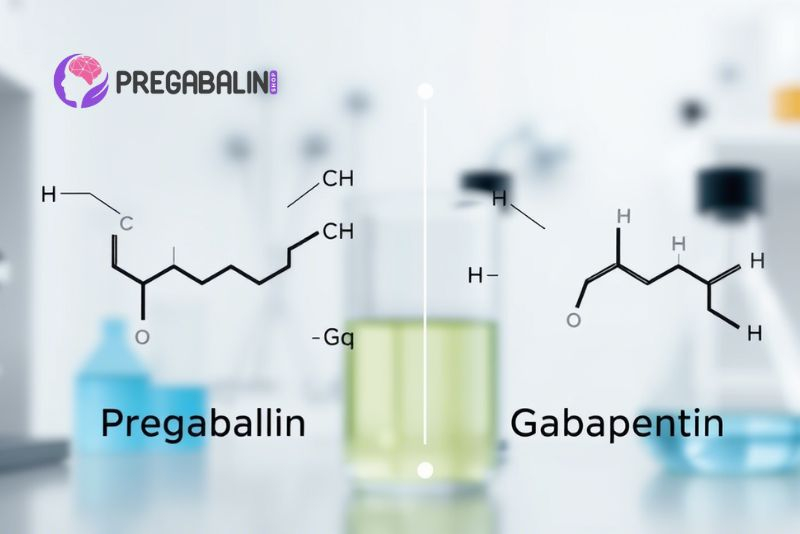
Pregabalin and Gabapentin are two commonly prescribed medications used to treat nerve pain, epilepsy, and other neurological conditions. While they share similarities in their mechanism of action, there are key differences in their efficacy, dosage, and side effects. In this blog, we will explore the similarities and differences between Pregabalin and Gabapentin to help you understand which medication may be more suitable for you.
What Are Pregabalin and Gabapentin?
Pregabalin (brand name: Lyrica) and Gabapentin (brand names: Neurontin, Gralise) belong to a class of drugs known as anticonvulsants or gabapentinoids. They work by affecting calcium channels in the nervous system, thereby reducing nerve-related pain and seizures. Both medications are primarily used for treating neuropathic pain, fibromyalgia, and epilepsy, though their specific uses and efficacy can vary.
Differences Between Pregabalin vs Gabapentin
| Feature | Pregabalin (Lyrica) | Gabapentin (Neurontin) |
|---|---|---|
| FDA Approval | Approved in 2004 | Approved in 1993 |
| Mechanism of Action | Modulates calcium channels to reduce nerve excitability | Similar action but binds less tightly to calcium channels |
| Bioavailability | Higher (90%) | Lower (varies with dose, ~30-60%) |
| Absorption | Faster onset of action (1 hour) | Slower onset (2-3 hours) |
| Half-Life | ~6 hours | ~5-7 hours |
| Dosing Frequency | 2-3 times per day | 3 times per day |
| Indications | Neuropathic pain, fibromyalgia, epilepsy, generalized anxiety disorder | Neuropathic pain, epilepsy, postherpetic neuralgia |
| Side Effects | Dizziness, weight gain, dry mouth, blurred vision | Drowsiness, dizziness, weight gain, peripheral edema |
| Potential for Abuse | Higher (classified as a Schedule V controlled substance) | Lower (not classified as a controlled substance in many regions) |
Uses and Side Effects
| Category | Pregabalin (Lyrica) | Gabapentin (Neurontin) |
| Uses | Neuropathic pain, fibromyalgia, epilepsy, generalized anxiety disorder | Neuropathic pain, epilepsy, postherpetic neuralgia |
| Common Side Effects | Dizziness, drowsiness, dry mouth, weight gain, blurred vision | Drowsiness, dizziness, fatigue, peripheral edema, weight gain |
| Serious Side Effects | Swelling of hands/feet, difficulty breathing, mood changes, muscle pain | Severe allergic reactions, mood swings, difficulty speaking, vision changes |
| Potential for Abuse | Higher (euphoric effects) | Lower |
Efficacy and Uses
- Neuropathic Pain: Studies suggest that Pregabalin may provide faster and more effective pain relief than Gabapentin due to its higher bioavailability and stronger binding to calcium channels.
- Fibromyalgia: Pregabalin is FDA-approved for treating fibromyalgia, while Gabapentin is sometimes used off-label for this condition.
- Epilepsy: Both drugs are used as adjunct treatments for epilepsy, with no major differences in effectiveness.
- Generalized Anxiety Disorder (GAD): Pregabalin is approved in some countries for treating GAD, while Gabapentin is occasionally used off-label for anxiety.
Which One Should You Choose?
The choice between Pregabalin and Gabapentin depends on several factors, including the condition being treated, side effect profile, cost, and patient preference.
- Choose Pregabalin if you need faster pain relief, are treating fibromyalgia, or require an effective treatment for generalized anxiety disorder.
- Choose Gabapentin if you are looking for a lower-cost alternative with a similar mechanism of action and are more concerned about potential abuse or dependency issues.
Conclusion
Pregabalin and Gabapentin are both effective medications for nerve pain, epilepsy, and other neurological conditions. While they share similar mechanisms of action, Pregabalin has a faster onset, higher bioavailability, and is considered more potent. However, it also has a higher risk of abuse compared to Gabapentin. Ultimately, the best choice will depend on your specific medical needs and your doctor’s recommendation.
If you are considering either medication, consult your healthcare provider to determine which option is most suitable for your condition and health profile.

